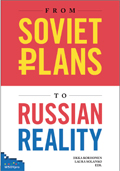 |
The common theme of the articles in this celebratory publication is the intertwining of economics and politics. In the last two decades, the cold war superpower has become one of the world's largest emerging economies. Has Russia become a normal country? The book's articles paint a picture of a market economy, characterised by many unique features. The close relationship between the country's economy and politics influence such issues as the structure of the Russian economy, economic policy and the nation's ability to develop genuinely new and innovative products. |
|---|
In the opening article "Revising Russia's Financial Crash of 1998", Anders Åslund of the Peterson Institute for International Economics, returns to the Russia of 1998, looking at its economic crisis and the reasons behind it. Åslund highlights how, before 1998, the Russian state became insolvent from years of irresponsible economic policies and the ensuing spiral into indebtedness. At that time, international financial institutions' played an almost insignificant role in the country, as no notice was paid to their advice in establishing the nation's economic policy. This latter is a particularly salient point, when considering the economic crisis of 2008–2010 and its effect on Russia.
Padma Desai of Columbia University looks at the emergence of the most recent crisis in Russia and draws attention to such issues as the economy's dependency on raw materials. This time around, when the crisis hit, the economy was in excellent shape, the current account showed a surplus and Russia’s foreign exchange reserves were the world's third largest, regardless of which the economy shrank significantly.
Vladimir Mau of the Russian Academy of National Economy examines the role played by the Government in society. Mau recalls that the significance of government measures and operating approaches are very different in different societies at diverse stages of their development. A putatively innovative post-industrial society demands flexibility, predictability and a light legislative touch from its public sector. Which gives rise to the question, is real economic reform possible without reform of the political system? Mau offers plenty of food for thought to those who follow developments in the Russian economy and politics.
The book also includes contributions by Masaaki Kuboniwa (Hitotsubashi University), Steven Rosefielde (University of North Carolina), Clifford G. Gaddy (Brookings), Barry W. Ickes (Pennsylvania State University) as well as Jouko Rautava and Iikka Korhonen (Bank of Finland). The book has been edited by Iikka Korhonen and Laura Solanko from the Bank of Finland's Institute for Economies in Transition (BOFIT). The book has been published by WSOYpro Ltd.
For further information, please contact
Laura Solanko, Senior Economist, tel. +358 10 831 2291, laura.solanko(at)bof.fi, or
Iikka Korhonen, Head of Research, tel +358 831 2272, Iikka.Korhonen(at)bof.fi.